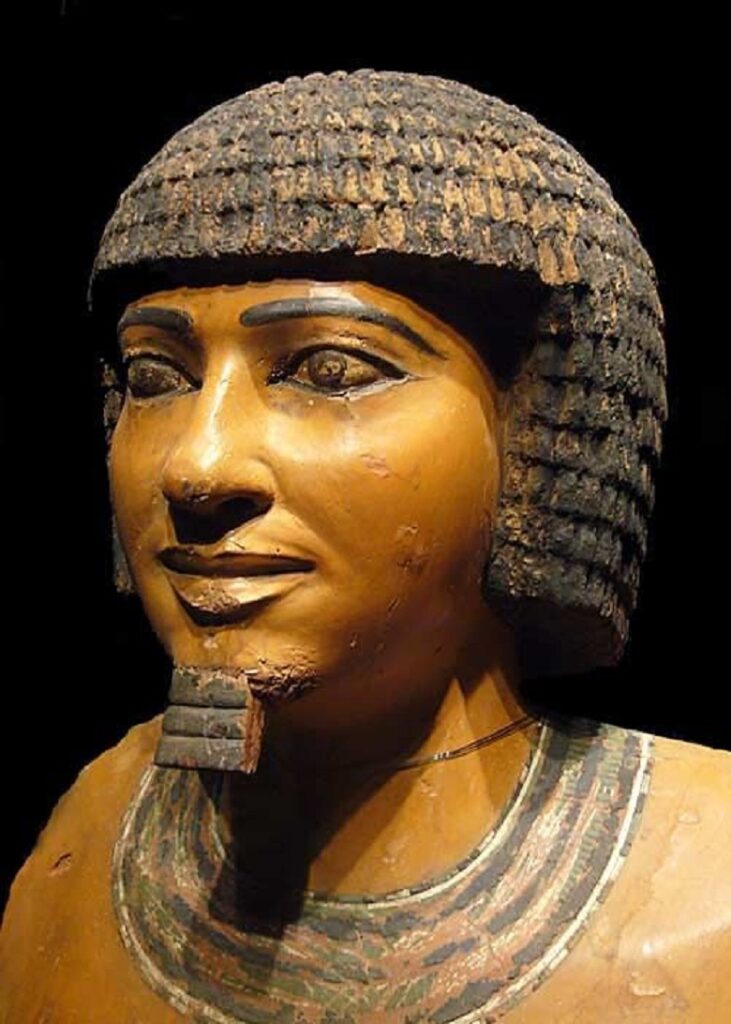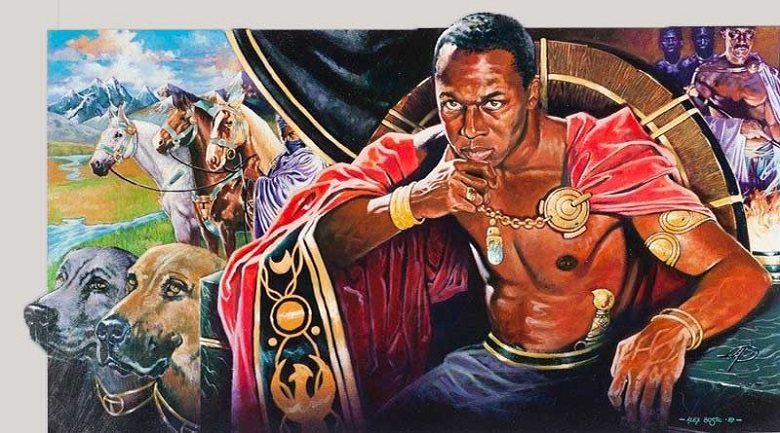Africa is a land with a long and illustrious history, with hundreds of different traditions and cultures. From the Egyptians to the Zulus, each culture has produced some of the world’s famous and greatest heroes kings in Africa.
The list concerns African kings of significant influence not just politically and militarily but also in popular culture. Calling them famous and heroes do not necessarily imply these were good people, but rather people who have a great, as in tremendous, even if some cases terrible, influence history.
Names of ancient famous king and heroes in Africa
1. Imhotep, Pharaoh of ancient Egypt (2220 BC)

Imhotep was an advisor during the reign of King Zoser of the Third Dynasty of Kemet. Known as the first great scientist of the world, Imhotep was an architect, astronomer, philosopher, poet, and physicist. As an architect, he was the author of the pyramids and the Saqqara complex.
His works received the highest honor of Kemet. As a physicist, Imhotep is the author of Edwin Smith’s Papyrus, which describes 90 anatomical drawings and 48 remedies. Hippocrates, the founder of Western medicine, was born 2200 years ago. Real name Im-hotep, “Prince of Peace,” whose tomb near Memphis is a pilgrimage shrine.
A philosopher and poet, Imhotep is best known for his quote, “When we die, eat, drink and be glad for tomorrow.” Nearly 2,000 years after his death, Imhotep defile by the inhabitants of Kemet. He is known as Asclepius, the god of medicine for the Greeks.
2. Benhanzin Hossu Bowelle, King Shark (1841-1906)
Behanzin was the most powerful king in West Africa at the end of the nineteenth century. He strongly resisted the European incursion into his country. These were made possible by a physically adapted army that included a division of 5,000 female warriors. He often refers to as “King Shark,” a surname of the Dahomeyans who symbolized strength and wisdom. He was also very interested in the humanities.
3. Shaka Zulu, king of the Zulus, South Africa (1818-1828)
Shaka Zulu was one of the most famous African kings. He remembers turning Zulu warriors into great warriors. It knows that its warriors used standardized weapons and great tactics to fight against their enemies. As a result, Zulu became a mighty kingdom under Shaka’s rule until his death. Emerging from nowhere, Shaka Zulu developed a short and sharp spear called the Assegai and a large shield that could protect his legions from the spears thrown by his opponents.
In a short time, Shaka Zulu managed to transform his troops into an incredible fighting machine, which made him fearful of most of his enemies. When they saw his troops, most of them fled; he eventually succeeded in uniting all groups in South Africa racially. To date, he is recognized worldwide as a great military innovator and one of the most potent leaders in African history.
4. Mansa Musa, king of Mali (1306-1332)
Mansa Musa was a great economist and man of art, known for the impact of his magnificent model creations. In 1324, he led his people on the Hajj pilgrimage to Mecca from Timbuktu in a holy pilgrimage. His caravan consisted of 72,000 people, and he was able to safely cross the desert and the Sahara Desert, a total distance of 6,496 miles. The event was spectacular, and Mansa Musa earned the respect of disciples and business people worldwide.
Under his regime, Mali was one of the most prestigious and wealthy empires in the world. The country is currently home to one of the most prestigious universities (Timbuktu).
5. Tenkamenin, king of Ghana (1037 – 1075 AD)
Ghana would not have reached its zenith without King Tenkamenin. To date, King Tenkamenin is widely known as the king who facilitated the Saharan gold trade. As a result, his kingdom became an industrial powerhouse, and his government became admired by many African kings, just as it was then.
On top of that, he was very social with his people, and he rode his horse every day to listen to their problems and concerns. He insisted on justice and went even further by giving his people a forum to address their grievances and make suggestions simultaneously.
6. Mutota, The great Mutota (1430-1450)
In 1430 Mutota was the king. In European countries, it was called “Mutota the Great.” He and his council quickly understood that only an African unity with a strong central government could stop European criminals. These should also be achieved by a voluntary association if possible. Mutota and the new bosses have understood this well.
Therefore, Mutota set up his plan to unite Africans in a vast empire that would cut across South Africa below the Limpopo River and cover Zimbabwe, with an indefinite border beyond the Zambezi River in Zambia, and over Mozambique to the Indian Ocean, to the southern coast. This sector contained most of the world’s precious metals such as gold, copper, tin, and iron held in more than 4,000 mines. After many years of struggle, unity took place in the empire of Monomotapa.
7. Samori Toure, King of Sudan ( 1830 to 1900)
The rise of the one and only Samori Toure began when her hometown of Bissandugu attack, and several family members – including her mother – were captured as slaves. Convincingly, he managed to convince King Berete to allow him to change places with his mother. He ended up joining the king’s army and quickly rose to the top level in the military. After serving for some time in Berete’s army, he was allowed to return to his homeland, where he immediately became king.
His first conquest was to unify all of West Africa and form a powerful state. Likewise, he chose to oppose all French attempts to exploit Africa and fight them whenever they moved. The tremendous military training he gave to his troops and the tactics used by his army throughout the time of war made him one of the very dread kings of the Europeans. His 30 years in power earned him the Africans’ respect, and he will never forget as an African leader who fought fiercely to prevent Africans’ colonization.
8. Jaja, King of Opopo (1821 – 1891)
King Jaja of Opobo (Nigeria) was made a slave at the age of 12. After being freed, this young Ibo discovered a talent for commerce. He founded the territory of Opobo on the banks of the Nigeria River. This place will prove to be strategic in trade and will very quickly covet by Europeans.
He signed a trade freedom agreement with the English, hoping to trade with the latter, who had other intentions concerning Africa. Jaja will resist the numerous attempts of incursions into his territory until the age of 70 years. In 1887 he was arrested and accused of not having respected the terms of the Treaty of Berlin of 1885, which guaranteed the freedom of navigation and free trade on his territory; he deports to Barbados.
9. Moshoeshoe, King of Basutoland (1815-1868)
Moshoeshoe was a wise and righteous king who was as brilliant at diplomacy as when he was at war, unifying diverse ethnicities into a stable society where law and order reigned. Thanks to peace, he knew how to make prosperity possible, so he often avoided conflicts by skillful negotiations. Moshoeshoe solidified Basotho’s defenses in Thaba Bosiu, their capital located in the mountain.
10. Osei Kofi Tutu, King of Asante (1680-1717)
Osei Kofi Tutu was the founder and first king of the country of Asante, a prominent West African kingdom in what is now Ghana. He could unite more than six different nations under his leadership. Gold became a sacred symbol, the nation’s soul, which was particularly appropriate for him because gold was the primary source of Asante’s wealth.
During the reign of Osei Tutu, the geographical area of Asante tripled. The kingdom had become a great state with a military and political system that would last for two centuries.
